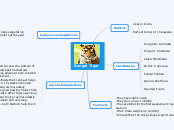by Andrew McGinnity 8 years ago
436
Animal Chart
The Bengal Tiger, classified under the genus Panthera, is a remarkable member of the Felidae family and thrives predominantly in India, particularly within dense vegetation and savanna regions.

by Andrew McGinnity 8 years ago
436

More like this